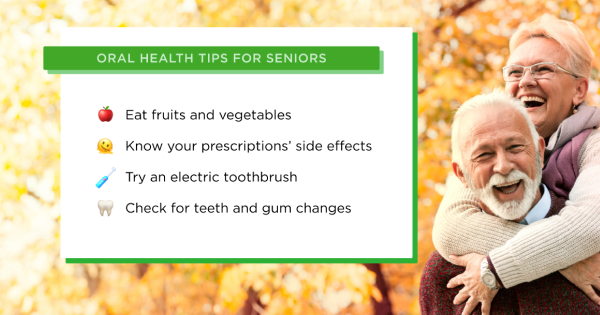
7 questions to ask older patients about health issues that can impact oral health
Nearly 1 out of every 5 Americans are seniors (ages 65 and up), which is the highest proportion of senior citizens in the country’s history. With a growing population of older Americans, dental professionals need to be on the lookout for age-related dental issues. Here are 7 questions related to oral health that you may want to start asking your senior patients:
How many prescription and OTC medications are you taking?
39% of seniors take 5 or more prescription medications. Many of these drugs have dental side effects, including xerostomia.
Are you eating enough fruits and vegetables?
Eating a healthy diet becomes more difficult with softening teeth and gums. With a poorer diet, your patients are at an increased risk of health conditions like heart disease and diabetes that can negatively affect their oral health.
Are you experiencing dry mouth?
Xerostomia and salivary gland hypofunction affect approximately 30% of all seniors, even those not taking multiple medications.
Do you remember to brush twice per day?
This can be a sensitive topic, but severe cognitive impairment increases the risk of periodontal diseases and infections. These patients may forget to take medications and to manage their oral hygiene. Make sure they and their caregivers know that the ADA recommends patients with cognitive limitations brush their teeth two or more times per day.
Do you have arthritis?
Daily functions like brushing and flossing can become much more difficult for these patients. Some may be tempted to forego them altogether. Make sure they know about electric toothbrushes and flossing tools which can be a lot easier on painful joints.
In addition, patients experiencing rheumatoid arthritis (RA) are at an elevated oral health risk. RA can cause gingivitis, periodontitis and other serious conditions.
Do you have a chronic condition, such as diabetes or heart disease?
These patients may not be aware that their condition can manifest in their teeth and gums. Make sure they are actively managing any chronic conditions, and are aware they may need additional treatments to prevent tooth loss and other oral health issues.
Are you experiencing hearing loss?
Make sure to enunciate and lower your mask when speaking to them so they can hear everything you say and don't miss your valuable advice.
Are you experiencing vision loss?
Make sure to speak clearly and explain everything as these patients may not pick up on nonverbal cues. If there is a window in your office, consider lowering the blinds or closing the shades to reduce glare that can hurt their eyes.
Recent posts
- Oral health care for seniors: Improving access, improving outcomes
- Simplify your credentialing with CAQH: Check out our webinar recordings
- Updated 2026 CDT codes are here
- View our CDT 2026 Updates webinar and stay on top of code changes
- EFT will become our standard payment method starting 1/1/27
- Start the year strong: Key reminders to support your practice in 2026
- Discover 3 tips to power up your practice with new workflows
- Updated 2026 CDT codes are here
- Partner with us to improve the health outcomes of our shared members
- Say hello to our 2026 Medicare Advantage DHMO partners
